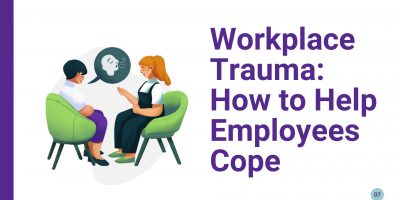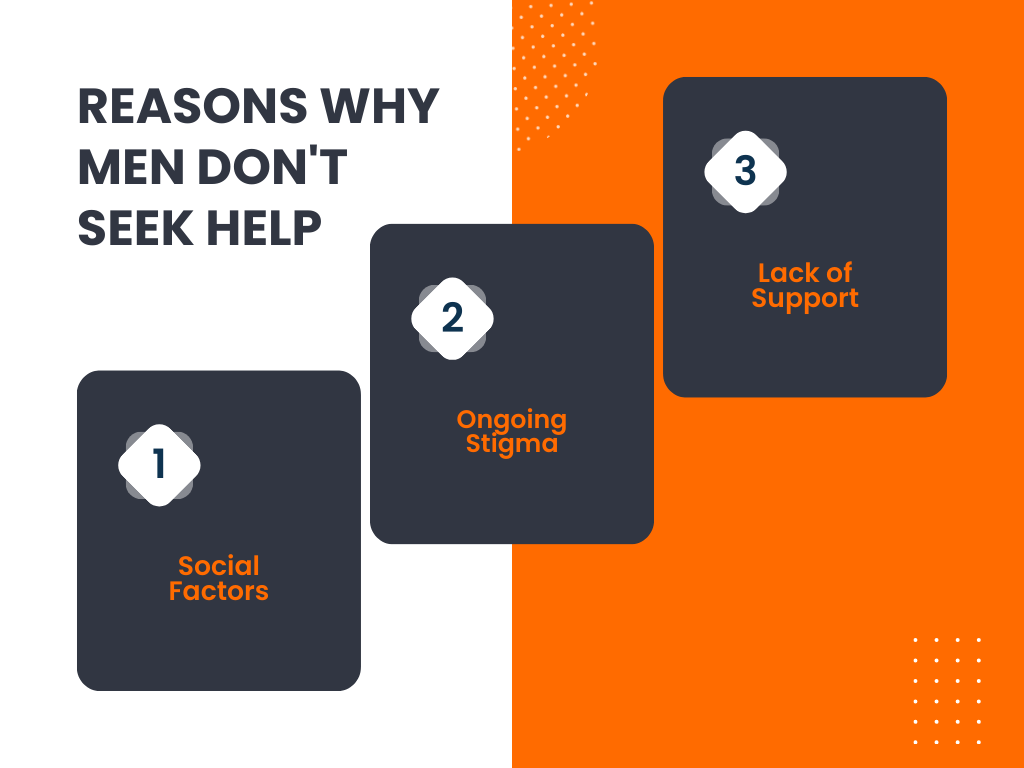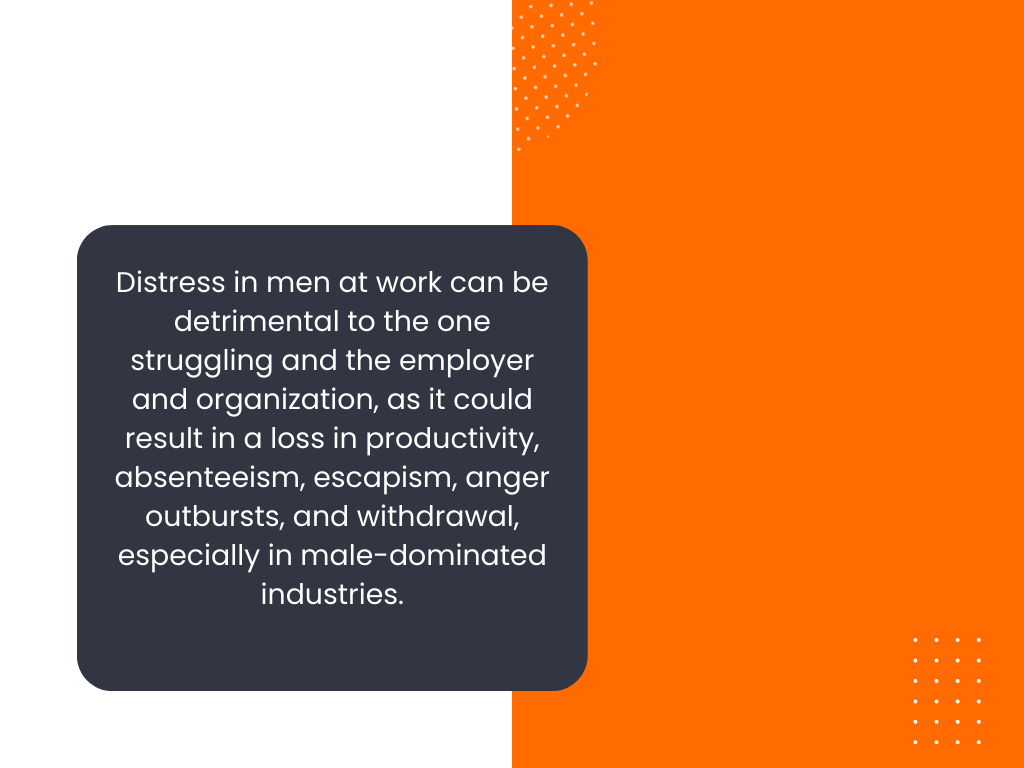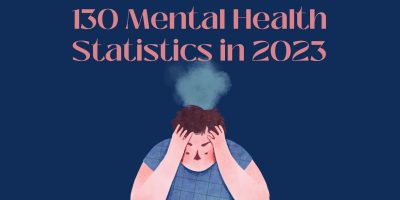
Workplace Trauma: How to Help Employees Cope
Learn to recognize workplace trauma early on, address it correctly, and support struggling employees throughout their emotional recovery.

The discussion around mental health seems to be greater than ever, emphasizing awareness, detection, addressing, and support. Yet, there is still a stigma around it regarding men’s mental health.
Science backs up what is conceived as a societal perception that men are finding ways to “man up” instead of seeking professional help when faced with mental health issues.
Consequently, even though over six million men suffer from depression every year, many of them won’t speak up and get treatment, leaving plenty of cases of male depression undiagnosed.
The need for a shift in perception of male mental health and providing timely and ongoing support via initiatives, men’s health programs, and social support networks is now more crucial than ever.
Even though mental health should be in focus throughout the whole year, June is the month in which men’s mental health becomes the topic of conversation. Beginning in 1994 but gaining more attention in recent years, the week before Father’s Day in June is considered Men’s Health Week.
Another month that focuses on men’s health is November, during which multiple Movember initiatives are centered around raising awareness for men’s health, particularly prostate and testicular cancer, and mental health through suicide prevention.
There are many reasons behind men’s reluctance to turn to professional help when facing mental health problems. From societal norms, through stigma around mental health, to lack of resources – various factors can lead to men’s mental health issues going undetected and, thus, not treated properly, leading to even greater physical and mental problems.
Social Factors
The stereotypical behaviors behind toxic masculinity are still deeply rooted in our societies, depicting men facing mental issues and seeking help as weak. Suppressing emotions and mental health issues, not showing signs of pain, and ignoring asking for help are some of the most common ways in which men face challenges in communities with limiting beliefs like these.
Ongoing Stigma around Mental Health
The stigma around mental health problems is still present today, especially in the workplace. It leads to even greater reluctance for people struggling to open up, rooted in the fear of the consequences they may face professionally and personally.
Lack of Support and/or Resources
The fact that fewer men are receiving mental health help may be entrenched in the lack of awareness of men’s mental health challenges or the need for specific solutions, services, and networks customized specifically for them.
These disparities are even more evident in LGBTQ+ men, Black men, and people with disabilities, who all have higher mental health risks due to more pronounced psychological distress.

As with any other health condition, if left untreated, mental health problems can lead to chronic and more serious illnesses.
Even though depression is twice as likely to affect women than men, in some mental health issues, this percentage becomes even between genders or is apparent in men in the form of mental health issues, such as ADHD.
Besides depression, according to Mental Health America’s statistics, 10% of men suffer from eating disorders, such as anorexia or bulimia, while over three million men have some kind of phobia or panic disorder. Additionally, 90% of people diagnosed with schizophrenia by the age of 30 are men.
Lastly, statistics show there is a gender gap in suicide rates, with male suicide rates being constantly on the rise.
Thus, with men’s reluctance towards help in mind, it’s essential to develop programs and solutions that will address specific male health problems.
To seek answers to the problem, one must be aware of it, accept it, and take the steps necessary toward the solution. Thus, we must first recognize the signs and symptoms of men struggling with mental health issues.
The symptoms and signs can be present in any aspect of men’s lives, including physical appearance, daily interactions, family relations, work performance, social activities, and more. These may include:
The gender disparity in suicide rates clearly depicts the consequences of neglecting men’s mental health issues.
Besides the most apparent outcomes of ignoring mental health issues, such as their worsening, there are other ways in which mental health can affect overall health. These include the onset of cardiovascular, metabolic, and chronic diseases, sexual dysfunction, and more.
There is much that can be done to improve men’s health not only during Men’s Mental Health Month throughout the entire year. Strategies developed with men’s mental health in mind may consist of:
Raising Awareness Initiatives
Getting oneself and others familiar with men’s mental health struggles can be done via events, raising money for a mental health charity or organization, and education through awareness campaigns. These initiatives can help remove the taboo of men’s mental health, normalize the debate of it, and ultimately encourage men to seek help.
Annual Check-Ups
Besides physical screenings, men should create a habit of seeking mental health services, especially during rough times, and, thus, embrace a holistic approach toward their health.
Resources
Online mental health resources can be beneficial for men struggling with mental health problems. Some of those include tips to manage depression and anxiety, self-screening tools, discussion forums, practice conversation tools, crisis resources, and more.
Here are some helpful online resources:
Men’s Health Programs
Distress in men at work can be detrimental to both the one struggling and the employer and organization as well, as it could come with a loss in productivity, absenteeism, escapism, anger outbursts, and withdrawal. This can be even more present in male-dominated industries.
Therefore, apart from fostering a culture of open communication, where every employee can share how they feel without the shame of stigma, employers should support their workers by providing well-established programs aimed at specific problems men face.
Support Groups & Networks
Men’s support groups allow their members to express their feelings openly without being judged and are a good option for connecting with like-minded individuals.

Taking care of our overall welfare, including mental health and well-being, should be on everyone’s daily task list.
While events such as Men’s Mental Health Month are great reminders to ask for help when needed and adopt healthy habits, it’s essential to provide ongoing, multifaceted solutions and create men’s support networks to give a voice to this so-called silent crisis.
SEO Manager at Shortlister
Browse our curated list of vendors to find the best solution for your needs.
Subscribe to our newsletter for the latest trends, expert tips, and workplace insights!

Learn to recognize workplace trauma early on, address it correctly, and support struggling employees throughout their emotional recovery.

Uncover the pressing realities of mental health through insightful statistics, highlighting the urgent need for comprehensive support and awareness.

Investing in mental health benefits is no longer a question of whether or how much it pays off but how long companies can afford to ignore it.

From decreased productivity to poor workplace relationships – gain insights on recognizing, addressing, and mitigating the consequences of substance abuse at work.
Used by most of the top employee benefits consultants in the US, Shortlister is where you can find, research and select HR and benefits vendors for your clients.
Shortlister helps you reach your ideal prospects. Claim your free account to control your message and receive employer, consultant and health plan leads.